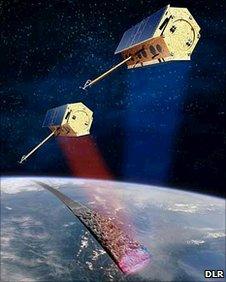German space escapes budget cuts
- Published

Prof Woerner and German Chancellor Angela Merkel at ILA2010
Professor Jan Woerner, chairman of the German Aerospace Centre (DLR), says he does not expect space to be affected by the nation's big austerity drive.
Berlin plans to cut the national budget deficit by a record 80bn euros ($96bn; £66bn) by 2014.
Only education and research will be spared from the cutbacks, receiving an extra 12 billion euros as planned.
"So far we don't see any impact on space and aeronautics," Professor Woerner told the BBC.
He was speaking on the opening day of the Berlin Air Show (ILA - International Aerospace Exhibition).
Professor Woerner said he hoped also that countries across Europe could follow Germany's lead and maintain spending on science and education.
"There are some countries where conditions are much more difficult than in Germany, and I would hope still that those countries understand in such difficult conditions you must not at all cut back on research and development and education.
"They are a guarantor for the future capability of Europe as a market, and therefore I think the decision taken by the German cabinet is the right one."
Robotic 'overlap'
DLR, which acts as Germany's space agency, is using ILA2010 to highlight its activities, both at a national level and in the context of the European Space Agency (Esa) where the country is the second largest contributor currently.
DLR will be signing an agreement with the pan-European agency this week that will make Germany's new Institute of Robotics and Mechatronics an "Esa reference laboratory".
This means Esa will look to the work of the institute, based at Oberpfaffenhofen, to provide it with the capabilities needed on space missions.
Some 120m euros are being invested in the centre. It will investigate autonomous robots for the servicing of spacecraft in orbit and for the exploration of the planets, among other projects.
Last year, Esa agreed to give its new technical centre at Harwell in the UK a space robotics portfolio, and Professor Woerner said the British facility would need to choose its research areas carefully so as not to clash with German expertise.
"If you look into the convention of Esa, it should always use the competencies already existing in the different member states," he told BBC News.
"So to create a new robotics centre would be a little bit in contrast to that. I am sure there are enough areas to work on, but it should be harmonious and not a competition between Harwell and Oberpfaffenhofen."
Esa's director general Jean-Jacques Dordain said he would ensure there was no conflict.
"I am there to avoid duplication. It would be totally stupid to develop in Harwell expertise and technologies which already exist in DLR. I am sure that in terms of robotics there is still a lot that does not exist."
Spending freeze
On the general financial picture, Mr Dordain said Esa also had to reflect on the current situation and be mindful of the difficulties certain nations had in meeting all their commitments.

Artist's view of Tandem-X and Terrasar-X in orbit together
Esa spending in 2010 and 2011 has been frozen. Its budget this year is about 3.7bn euros in total. Spain, in particular, which contributes some 5% (195m euros) of Esa's funding is having difficulties meeting its subscription. It has asked the agency, if necessary, to take out a loan to cover any shortfall in that subscription.
"I have asked the directors of Esa to implement their programmes in such a way that I do not have to ask for more money than in 2009," Mr Dordain said.
"But I can tell you that I have not received any demand from any member state to stop programmes or cancel commitments, including from Spain."
France (18%) and Germany (17%) are the two biggest contributors to Esa' budget. Germany's national expenditure brings its total space spend to about 1.3bn euros a year.
A clear example of Germany's national programme will be seen in the coming days when it launches its latest radar satellite, Tandem-X, to link up with its sister mission, Terrasar-X, in orbit.
- Published1 June 2010